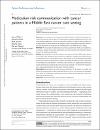Medication risk communication with cancer patients in a Middle East cancer care setting
Date
2016-04-22Author
Wilbur, KerryAl-Okka, Maha
Jumaat, Ebaa
Eissa, Nesma
Elbashir, Merwa
Al Saadi Al-Yafei, Sumaya M.
...show more authors ...show less authors
Metadata
Show full item recordAbstract
Purpose: Cancer treatments are frequently associated with adverse effects, but there may be a cultural reluctance by care providers to be forthcoming with patients regarding these risks for fear of promoting nonadherence. Conversely, research in a number of countries indicates high levels of patient desire for this information. We sought to explore cancer patient experiences, satisfaction, and preferences for medication risk communication in a Middle East care setting.
Methods: We developed and administered a ten-item questionnaire (Arabic and English) to a convenience sample of consenting adult patients receiving treatment at the National Center for Cancer Care and Research in Qatar.
Results: One hundred and forty-three patients were interviewed. Most (88%) stated that the level of side effect information they received was sufficient, with physicians (86%) followed by pharmacists (39%) as the preferred sources. The majority (97%) agreed that knowing about possible side effects would help them recognize and manage the reaction, and 92% agreed that it would help them understand how to minimize or prevent the risks. Eighteen percent indicated that this information would make them not want to take treatment. Two-thirds (65%) had previously experienced intolerance to their cancer treatment regimen.
Conclusion: Most patients surveyed expressed preference for the details of possible side effects they may encounter in their treatment. However, one in five considered such information a factor for nonadherence, indicating the need for patient-specific approaches when communicating medication risks.
Collections
- Pharmacy Research [1448 items ]


